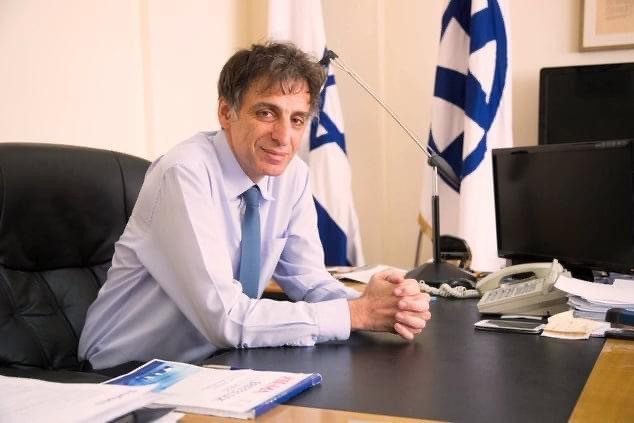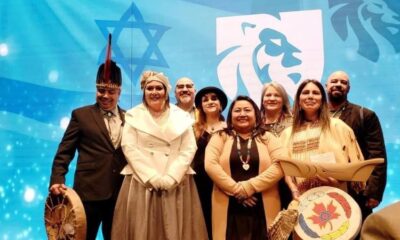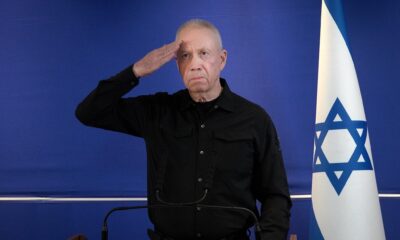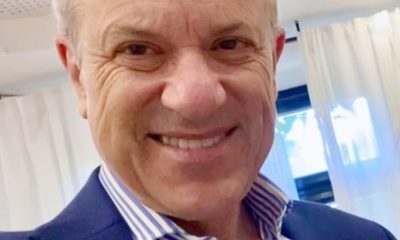
Israel

New Israeli ambassador – a natural born diplomat
The new Israeli ambassador to South Africa, Eli Belotsercovsky, dreamt of being a diplomat from an early age when he was still a child in the Soviet Union.
That is, once he realised that his first dream of being a “discoverer of new lands” was scuppered because most land had already been discovered and well explored before his time.
“Soon after that, I decided that being a diplomat was the right career for me as it enabled me to travel a lot,” Belotsercovsky told the SA Jewish Report this week. “It was a constant source of amusement when I said this because a Jewish kid in the Soviet Union was unlikely to be able to do this.”
However, once his family made aliya when he was just nine years old, his ambition to have a diplomatic career became possible.
Last week, President Cyril Ramaphosa amiably accepted Belotsercovsky’s credentials as ambassador, a relief for some and a frustration for the Israel-hating lobby.
The new ambassador was pleased with his reception and the warm welcome from the president. “We really got the red-carpet treatment,” he said.
Some would expect South Africa not to be the favoured destination of a diplomat because of the animosity from the ruling party toward the Jewish State, however Belotsercovsky said the opposite was true. “I had fierce competition in getting this post, and perhaps it was my karma that won me the position,” he said.
The ambassador is excited about the prospect of improving relations between South Africa and Israel, which he sees as a challenge. “So far, I have met very friendly people here who are interested and favourable towards Israel. I will build on this.”
But then, Belotsercovsky clearly doesn’t shy from a challenge. His first official full ambassadorial position was in the Ukraine, and he arrived there at the beginning of the war between Ukraine and Russia. “For a diplomat, it was a fascinating time. It was a nation in transition and had a revolution and a new government that was establishing itself,” he said.
Belotsercovsky was born not too far from there, in Mordova Republic, which like the Ukraine, was part of the former Soviet Union. Like the Ukraine, Mordova had a large Jewish community.
His father was a Zionist and wanted to move to Israel at the first opportunity. “He taught English,” said Belotsercovsky. “He was talented with languages. He would listen to Voice of America and the BBC, which were obviously not allowed, so he knew what was going on in the world.”
The family made aliya in 1973, and got to Israel five days before the start of the Yom Kippur War. “There was such a stark difference between the Soviet Union and Israel,” he said. “Coming from Eastern Europe, which was dark and gloomy, we found Israel full of light and warmth. But coming into a war situation made our absorption much faster. There were lots of alarms going off and running to bomb shelters and worried adults.”
Arriving in a country and not speaking the language wasn’t easy for the young Belotsercovsky. “I would go to school, but I had no clue what was going on. Fortunately I spoke English, which helped, because my father taught me.”
But it wasn’t easy as they left Mordova with nothing of value beside books, so they had to start from scratch.
He could be considered a diplomat in training throughout his childhood, as he moved to six schools in different areas, staying just a year or two in each school. They eventually landed up in Tel Aviv. “Our lifestyle was dictated by my dad’s work,” he said. “Settling down is a concept unfamiliar to me.”
After school, he spent four years in the air force, which he said contributed substantially to who he is today. “It was an important part of maturing and learning what you want. I learnt to manage the need to deliver the best I can and on time. There was no time for idiosyncrasies, you had to be on point and precise.”
Thereafter, he got the first real opportunity to travel – as most Israeli youngsters do after the army – and he went to India, Nepal, Thailand and other nearby countries. He felt a real sense of freedom in that part of the world.
After a year, he returned to Israel to study a Bachelor of Arts in International Relations and Chinese Studies at Hebrew University in Jerusalem. The former was obvious, but the Chinese was partially because he was fascinated by the culture and language, but also because his dad – who spoke most European languages fluently – didn’t speak Chinese. “So I knew he wouldn’t be correcting me, and I wouldn’t feel like I was competing with him,” said Belotsercovsky.
He then went on to do a masters in international management. “This was useful because it enabled me to discover that I had no talent for or future in business,” he said with a wry smile.
He then applied and got accepted into the ministry of foreign affairs. His first assignment was to Singapore for three years, which he said was a fascinating place with friendly and curious people. It was also the place he first met the woman who would become his wife, Elena Esteban Oleaga.
He then moved to Cyprus, which was around the time of the Second Intifada, and though “the people were friendly, the media coverage was intense”.
Two years later, he went back to Israel, where he stayed for three years before fulfilling a dream of going to India for four years as deputy ambassador.
“It’s hard to explain what’s so exciting about India. It’s not something rational, but experiential. India is like a ball with little mosaic shiny pieces that fit together in perfect harmony. It’s such a good example of religious tolerance.” It was in India that he and his wife got together after 10 years of communicating long distance. They married in 2015.
His next posting – after three years in the economic department of the foreign ministry – was his first ambassadorial post to Kiev in the Ukraine. It was a tough time, but he was no stranger to areas that were formerly in the Soviet bloc, and he spoke Russian, which helped. “I learnt a great deal from other diplomats there,” he said. “As a diplomat, being in a country at war is a unique but exciting experience.”
He then found himself as chargé d’affaires in Moscow when the embassy was in between ambassadors, which was a tough time because it was the beginning of the COVID-19 pandemic. “I was trying to keep the embassy intact and nobody knew how things were going to develop,” he said. “It was essential to take care of the people and control their anxiety.”
After that, South Africa sounded like the perfect destination. So, he applied. “This is one of the most important countries in Africa with interesting relationships and a very prominent Jewish community. As I have said, I have a soft spot for adventure, so this place was perfect.
“I have come here to strengthen relationships, and I believe there’s a great deal that can be done. We are already working in South Africa, sharing Israeli experience and technology, but it’s just a drop in the ocean. We can do so much more.”










